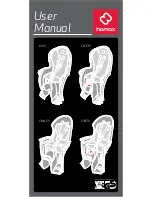
MN-745
11
Overnight leak down test — Recheck air pressure after the vehicle has been used for
24 hours. If the pressure has dropped more than 5 PSI, then there is a leak that must
be fixed. Either fix the leak yourself or return to the installer for service.
Air pressure requirements — I understand the air pressure requirements of my air spring
system. Regardless of load, the air pressure should always be adjusted to maintain ride
height at all times.
Thirty day or 500 mile test — I understand that I must recheck the air spring system after
30 days or 500 miles, whichever comes first. If any part shows signs of rubbing or abrasion,
the source should be identified and moved, if possible. If it is not possible to relocate
the cause of the abrasion, the air spring may need to be remounted. If professionally
installed, the installer should be consulted. Check all fasteners for tightness.
POST-INSTALLATION CHECKLIST
Clearance test — Inflate the air springs to 30 PSI and ensure there is at least ½” clearance
around each sleeve, away from anything that might rub against them. Be sure to check
the tire, brake drum, frame, shock absorbers and brake cables.
Leak test before road test — Inflate the air springs to 30 PSI, check all connections for
leaks with a soapy water solution. See page 10 for tips on how to spot leaks. All leaks
must be eliminated before the vehicle is road tested.
Heat test — Be sure there is sufficient clearance from any heat sources — at least 6”
for air springs and air lines. If a heat shield was included in the kit, install it. If there is no
heat shield, but one is required, call (800) 248-0892.
Fastener test — Recheck all bolts for proper torque. Axle straps carriage bolt lock nuts
should be torqued to 16 ft/lbs. Re-torque after 100 miles.
Road test — The vehicle should be road tested after the preceding tests. Inflate the air
springs to 25 PSI (50 PSI if the vehicle is loaded). Drive the vehicle 10 miles and recheck
for clearance, loose fasteners and air leaks.
Operating instructions — If professionally installed, the installer should review the
operating instructions with the owner. Be sure to provide the owner with all of the
paperwork which came with the kit.
Technician’s Signature ________________________
Date ______________
Before Operating
INSTALLATION CHECKLIST
Product Use, Maintenance and Servicing
10 PSI
100 PSI
FAILURE TO MAINTAIN CORRECT MINIMUM PRESSURE (OR PRESSURE
PROPORTIONAL TO LOAD), BOTTOMING OUT, OVER-ExTENSION OR RUBBING
AGAINST ANOTHER COMPONENT WILL VOID THE WARRANTY.
Maximum Air Pressure
Minimum Air Pressure
RideControl






































